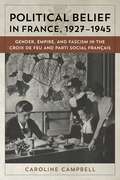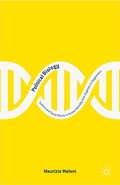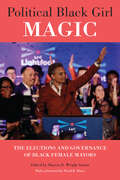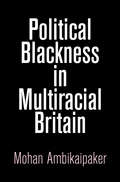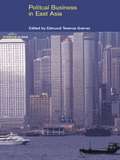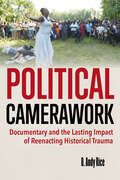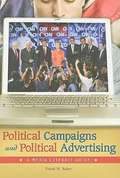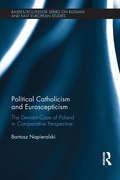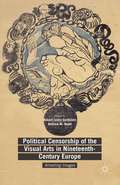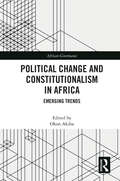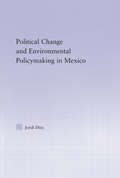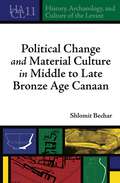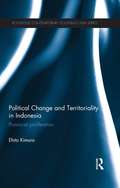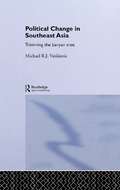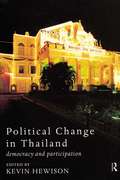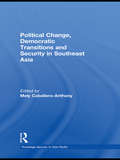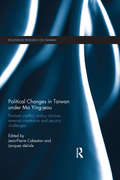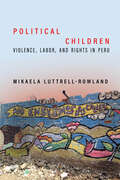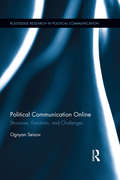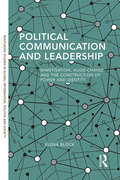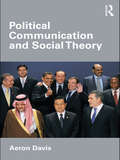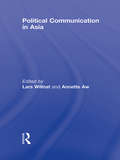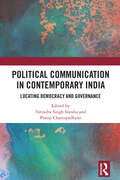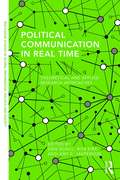- Table View
- List View
Political Belief in France, 1927-1945: Gender, Empire, and Fascism in the Croix de Feu and Parti Social Fran�ais
by Caroline CampbellIn the inter war era, the rise of the largest political movement in modern French history, the powerful Croix de Feu (1927-1936), and its successor, the Parti Social Français, or PSF (1936-1945), led to a sharp rightward turn in France's political culture. Political Belief in France, 1927-1945 traces the central role of women in this shift, arguing that they transformed the Croix de Feu/PSF from a paramilitary league for veterans into a social reform movement that sought to remake the politics, society, and culture of the French Republic. Following the creation of a Women's Section in 1934, the women of the Croix de Feu/PSF developed a wide array of social programs, including welfare services, youth development, and health-care initiatives. At a time of economic depression and high unemployment, these popular programs tempered the organization's fearsome reputation as a violent paramilitary group. While the efforts of the Women's Section had the veneer of moderation, they accentuated the long-standing conservative image of France as a deeply Christian society and sought to assimilate people of different ethnoreligious backgrounds into the dominant national community. Croix de Feu/PSF women promoted their socialagenda as a religious and patriotic duty, a reflection of the individual's responsibility to make personal sacrifices on behalf of their vision for France's Christian civilization. The Croix de Feu/PSF's ethnoreligious nationalism circulated throughout the French imperial nation-state, making the movement the premier defender of an empire at the height of its power. But women in North African branches faced substantial marginalization, and the movement remained dangerously sectarian in the Maghreb, driving indigenous activists from reformism to anticolonialism. The Croix de Feu/PSF thus set the stage for both the authoritarian, anti-Semitic Vichy regime and the decolonization that followed the war. The first book on women of the French far right in the age of fascism, Political Belief in France, 1927-1945 contributes to the fields of French history, gender studies, the history of fascism, and the history of empire.
Political Biology: Science and Social Values in Human Heredity from Eugenics to Epigenetics
by M. MeloniThis book explores the socio-political implications of human heredity from the second half of the nineteenth century to the present postgenomic moment. It addresses three main phases in the politicization of heredity: the peak of radical eugenics (1900-1945), characterized by an aggressive ethos of supporting the transformation of human society via biological knowledge; the repositioning, after 1945, of biological thinking into a liberal-democratic, human rights framework; and the present postgenomic crisis in which the genome can no longer be understood as insulated from environmental signals. In Political Biology, Maurizio Meloni argues that thanks to the ascendancy of epigenetics we may be witnessing a return to soft heredity - the idea that these signals can cause changes in biology that are themselves transferable to succeeding generations. This book will be of great interest to scholars across science and technology studies, the philosophy and history of science, and political and social theory.
Political Black Girl Magic: The Elections and Governance of Black Female Mayors
by Sharon D. Wright AustinPolitical Black Girl Magic explores black women’s experiences as mayors in American cities. The editor and contributors to this comprehensive volume examine black female mayoral campaigns and elections where race and gender are a factor—and where deracialized campaigns have garnered candidate support from white as well as Hispanic and Asian American voters. Chapters also consider how Black female mayors govern, from discussions of their pursuit of economic growth and how they use their power to enact positive reforms to the challenges they face that inhibit their abilities to cater to neglected communities. Case studies in this interdisciplinary volume include female mayors in Atlanta, Baltimore, Charlotte, Chicago, Compton, and Washington, DC, among other cities, along with discussion of each official’s political context. Covering mayors from the 1960s to the present, Political Black Girl Magic identifies the most significant obstacles black women have faced as mayors and mayoral candidates, and seeks to understand how race, gender, or the combination of both affected them. Contributors: Andrea Benjamin, Nadia E. Brown, Pearl K. Dowe, Christina Greer, Precious Hall, Valerie C. Johnson, Yolanda Jones, Lauren King, Angela K. Lewis-Maddox, Minion K.C. Morrison, Marcella Mulholland, Stephanie A. Pink-Harper, Kelly Briana Richardson, Emmitt Y. Riley, III, Ashley Robertson Preston, Taisha Saintil, Jamil Scott, Fatemeh Shafiei, James Lance Taylor, LaRaven Temoney, Linda Trautman, and the editor
Political Blackness in Multiracial Britain (The Ethnography of Political Violence)
by Mohan AmbikaipakerOne evening in 1980, a group of white friends, drinking at the Duke of Edinburgh pub on East Ham High Street, made a monstrous five-pound wager. The first person to kill a "Paki" would win the bet. Ali Akhtar Baig, a young Pakistani student who lived in the east London borough of Newham, was their chosen victim. Baig's murder was but one incident in a wave of antiblack racial attacks that were commonplace during the crisis of race relations in Britain in the 1970s and 1980s. Ali Akhtar Baig's death also catalyzed the formation of a grassroots antiracist organization, Newham Monitoring Project (NMP) that worked to transform the racist victimization of African, African Caribbean and South Asian communities into campaigns for racial justice and social change.In addition to providing a 24-hour hotline and casework services, NMP activists worked to mitigate the scourge of racial injustice that included daily racial harassment, hate crimes and antiblack police violence. Since the advent of the War on Terror, NMP widened its approach to support victims of the state's counterterror policies, which have contributed to an unfettered surge in Islamophobia.These realities, as well as the many layers of gendered racism in contemporary Britain come to life through intimate ethnographic storytelling. The reader gets to know a broad range of east Londoners and antiracist activists whose intersecting experiences present a multifaceted portrait of British racism. Mohan Ambikaipaker examines the life experiences of these individuals through a strong theoretical lens that combines critical race theory and postcolonial studies. Political Blackness in Multiracial Britain shows how the deep processes of everyday political whiteness shape the state's failure to provide effective remedies for ethnic, racial, and religious minorities who continue to face violence and institutional racism.
Political Business in East Asia (Politics in Asia)
by Edmund GomezThe relationship between government and business has become a central issue in East Asia since the financial crisis of 1997. As the Asian economies try to advance the reform process, recent scandals involving corruption and cronyism have demonstrated the ongoing significance of the issue. This edited book features a range of distinguished international specialists and explores the interaction between politics and business across the region. Detailed case-studies focus on Japan, China, South Korea, Malaysia, Thailand, Singapore and Indonesia. This is the first comprehensive introduction to government-business relations in the region and makes a significant contribution to our understanding of the problems faced by the Asian economies.
Political Camerawork: Documentary and the Lasting Impact of Reenacting Historical Trauma
by D. Andy RiceWhat mental and physical distress do actors, camerapersons, and reporters experience when working on reenactments of traumatic moments in history? In Political Camerawork, D. Andy Rice theorizes that the intense feelings produced while creating these performed scenarios, called "simulation documentaries," connect difficult pasts to the present. Building on his background as a nonfiction film director, producer, editor, and cinematographer, Rice analyzes performance techniques to gain insight into the emotional toll of simulation documentaries, including those reliving the Vietnam War, the US military's embodied training in California during the Iraq War, and an annual quadruple lynching reenactment organized by Black civil rights activists in Georgia.Investigating the lasting impact of these productions, Political Camerawork reveals that, by performing a simulation of a traumatic event they didn't directly experience, those involved become carriers of the trauma.
Political Campaigns and Political Advertising: A Media Literacy Guide
by Frank W. BakerBaker, a media literacy consultant and author, has written this media literacy guide for general readers who want more critical insight into propaganda and spin, political advertising and the role of new media technologies in election campaigns. The author uses clear and easy-to-understand language to examine and interpret the content of media messages in print, image and multimedia forms in an objective manner. The author supplies both a timeline of the history of media in politics from 1913 to the present and a glossary of political and media terms. Annotation ©2009 Book News, Inc., Portland, OR (booknews.com)
Political Catholicism and Euroscepticism: The Deviant Case of Poland in Comparative Perspective (BASEES/Routledge Series on Russian and East European Studies)
by Bartosz NapieralskiThis book explores the phenomena of both Political Catholicism and the growth of Euroscepticism across Eastern and Western Europe. It focuses in particular on Political Catholicism in Poland, but sets this in its wider European context. It examines the nature of Political Catholicism as a political movement, discusses the circumstances in which Political Catholicism, which has traditionally been pro-European, can turn to being Eurosceptic, and argues that Political Catholicism in Poland is a special case because of its Catholic-nationalist nature. The book concludes by assessing the role religion plays in the politics of modern Europe and outlines the implications for the future studies of European integration.
Political Censorship of the Visual Arts in Nineteenth-Century Europe: Arresting Images
by Robert Justin Goldstein Andrew M. NeddIn this comprehensive account of censorship of the visual arts in nineteenth-century Europe, when imagery was accessible to the illiterate in ways that print was not, specialists in the history of the major European countries trace the use of censorship by the authorities to implement their fears of the visual arts, from caricature to cinema.
Political Change and Constitutionalism in Africa: Emerging Trends (African Governance)
by Okon AkibaPolitical Change and Constitutionalism in Africa examines the complexities of government and obstacles facing constitutional democracy in transitional African societies. The chapters provide a critical, conceptual framework to probe, interpret and understand the dimensions of current and impending challenges to constitutional government in the African continent. The contributors explain why deep inequalities and harsh repression persist in most transitional African countries, despite constitutionally guaranteed rights and the ongoing, practical efforts to expand participation through political liberalization. The book demonstrates the importance of sustaining in public confidence in democracy and provides provocative ideas about how to deal with new, prodigious configurations of power that are stubbornly resisting real institutional change. Political Change and Constitutionalism in Africa will be of interest to scholars of African politics and constitutional politics.
Political Change and Environmental Policymaking in Mexico
by Jordi DiezThis book explores environmental policymaking in Mexico as a vehicle to understanding the broader changes in the policy process within a system undergoing a democratic transformation. It constitutes the first major analysis of environmental policymaking in Mexico at the national level, and examines the implementation of forestry policy in Mexico's largest rain forest, the Selva Lacandona of the state of Chiapas.
Political Change and Material Culture in Middle to Late Bronze Age Canaan (History, Archaeology, and Culture of the Levant)
by Shlomit BecharDo shifts in material culture instigate administrative change, or is it the shifting political winds that affect material culture? This is the central question that Shlomit Bechar addresses in this book, taking the transition from the Middle to Late Bronze Age (seventeenth–fourteenth centuries BCE) in northern Canaan as a test case.Combining archaeological and historical analysis, Bechar identifies the most significant changes evident in architectural and ceramic remains from this period and then explores how and why contemporary political shifts may have influenced, or been influenced by, these developments. Bechar persuasively argues that the Egyptian conquest of the southern Levant—enabled by local economic decline following the expulsion of the Hyksos and the fall of northern Syrian cities—was the impetus for these changes in ceramics and architecture. Using a macro-typological approach to examine the ceramic assemblages, she also discusses the impact of the influx of Aegean imports, suggesting that while “attached specialists” were primarily responsible for ceramic production in the Middle Bronze Age, Late Bronze Age ceramics were increasingly made by “independent specialists,” another important result of the new administrative system created following Thutmose III’s campaign.An important contribution to our understanding of the transition between the Middle and Late Bronze Ages, this original and insightful book will appeal to specialists in the Bronze Age Levant, especially those interested in using ceramic assemblages to examine social and political change.
Political Change and Territoriality in Indonesia: Provincial Proliferation (Routledge Contemporary Southeast Asia Series)
by Ehito KimuraWhat makes large, multi-ethnic states hang together? At a time when ethnic and religious conflict has gained global prominence, the territorial organization of states is a critical area of study. Exploring how multi-ethnic and geographically dispersed states grapple with questions of territorial administration and change, this book argues that territorial change is a result of ongoing negotiations between states and societies where mutual and overlapping interests can often emerge. It focuses on the changing dynamics of central-local relations in Indonesia. Since the fall of Suharto’s New Order government, new provinces have been sprouting up throughout the Indonesian archipelago. After decades of stability, this sudden change in Indonesia’s territorial structure is puzzling. The author analyses this "provincial proliferation", which is driven by multilevel alliances across different territorial administrative levels, or territorial coalitions. He demonstrates that national level institutional changes including decentralization and democratization explain the timing of the phenomenon. Variations also occur based on historical, cultural, and political contexts at the regional level. The concept of territorial coalitions challenges the dichotomy between centre and periphery that is common in other studies of central-local relations. This book will be of interest to scholars in the fields of comparative politics, political geography, history and Asian and Southeast Asian politics.
Political Change in South-East Asia: Trimming the Banyan Tree (Politics in Asia)
by Michael R.J VatikiotisPolitical Change in South-East Asia takes up the debate between those who resist the pressure for democracy and point to unchanging 'Asian' values, and those who believe that the appeal of democracy is universal.The author examines the case for both sides and concludes that the strong state will be a fixture of South-East Asian politics for some considerable time to come. Increasingly close links between the ten states of South-East Asia are likely to reinforce perceptions of a common culture and in the end put up more effective defences against external cultural influence.
Political Change in Thailand: Democracy and Participation (Politics in Asia)
by Kevin HewisonThis book provides an assessment of approaches to studying Thai politics, the various forces reshaping the forms of political activity and their roles in the fluid contemporary political environment. This volume will be of particular interest to those who require an understanding of the complex and rapidly changing political realities of contemporary Thailand.
Political Change, Democratic Transitions and Security in Southeast Asia (Routledge Security in Asia Pacific Series)
by Mely Caballero-AnthonyThe fragility of democracy in Southeast Asia is a subject of increasing concern. While there has been significant movement in the direction of democratisation, the authoritarian tendencies of popularly elected leaders and the challenges posed by emerging security threats have given rise to a shared concern about the return of military rule in the region. This book examines the nature of political transitions in Southeast Asia and why political transitions towards political liberalisation and democracy have often failed to take off. It considers political systems in Southeast Asia that have gone through significant periods of transition but continue to face serious challenges toward democratic consolidation. Some key questions that the book focuses on are – Are emerging democracies in the region threatened by weak, failed or authoritarian leadership? Are political institutions that are supposed to support political changes toward democratisation weak or strong? How can democratic systems be made more resilient? and What are the prospects of democracy becoming the defining political landscape in Southeast Asia?
Political Changes in Taiwan Under Ma Ying-jeou: Partisan Conflict, Policy Choices, External Constraints and Security Challenges (Routledge Research on Taiwan Series)
by Jacques DeLisle Jean-Pierre CabestanIn 2008 Ma Ying-jeou was elected President of Taiwan, and the Kuomintang (KMT) returned to power after eight years of rule by the Democratic Progressive Party (DPP). Since taking power, the KMT has faced serious difficulties, as economic growth has been sluggish, society has been polarised over issues of identity and policy, and rapprochement between Taipei and Beijing has met with suspicion or reservation among large segments of Taiwanese society. Indeed, while improved relations with the United States have bolstered Taiwan’s security, warming cross-Strait relations have in turn made Taiwan more dependent upon and vulnerable to an increasingly powerful China. This book provides a comprehensive analysis of the return of the Kuomintang (KMT) to power, and examines the significant domestic political, economic, social and international challenges and changes that have characterized Taiwan since 2008. It identifies the major domestic, cross-Strait and foreign policy trends, and addresses key issues such as elections and Taiwan’s party system; the role of the presidency and legislature; economic development; social movements; identity politics; developments in cross-Strait relations; Taiwan’s security environment and national defence policies; relations with the US and Japan. In turn, the contributors look towards the final years of Ma’s presidency and beyond, and the structural realities – both domestic and external – that will shape Taiwan’s future. Political Changes in Taiwan Under Ma Ying-jeou will be of great interest to students and scholars of Taiwan studies, comparative politics, international relations, and economics. It will also appeal to policy makers working in the field.
Political Children: Violence, Labor, and Rights in Peru
by Mikaela Luttrell-RowlandGrounded in extensive interviews, longitudinal methods, historical analysis, and archival work, Mikaela Luttrell-Rowland shows how two distinct groups of working young people in Lima, Peru have become political protagonists, resisting and critiquing the daily inequality and injustice they face. She details the ways these young people interpret and address a range of issues affecting their lives—from environmental degradation to second-rate public facilities, gender-based violence to dangerous working conditions—and reveals a range of ways they make sense of their systematic marginalization and their own labor, and in doing so, how they navigate everyday state violence. By attending to the affect, longing, and desires that animate these young people's politics, Luttrell-Rowland conveys the meaning of their lives and work in an economy that invokes their subjectivity and rights while rendering them non-participatory subjects. Though the lives of young people are often imagined as far from politics, these "political children" expose the contradictions of public policy narratives in which the Peruvian state is cast as a neutral site for engagement and action. Through their criticism and activism, the young people in this book demonstrate that such narratives divorce state power from the very places in which it is experienced as structural violence.
Political Communication Online: Structures, Functions, and Challenges (Routledge Research in Political Communication)
by Ognyan SeizovThe impact of the Internet on political communication has been significant and multifaceted: it expanded the reach of political messages; opened the floodgates of decontextualization and intercultural misunderstanding; made room for new genres and forms; and allowed for the incorporation of every previously existing communication mode into complex multilayered documents. Political Communication Online places these developments in their social and media context, covers various disciplinary backgrounds and how they can contribute to a common understanding of the evolving online media landscape, and proposes a novel methodological tool for the analysis of political communication online. Seizov offers an approach that places context at the core of the theoretical and methodological discussion by discussing the traits of online communication that make it a unique communication environment. The book then brings together different disciplines which have important contributions for the study of political communication online but have not been integrated for this purpose so far, such as visual communication, multimodal research, and cognitive psychology. Seizov introduces the book’s main theoretical and methodological contribution to multimodal document analysis, the annotation scheme "Imagery and Communication in Online Narratives" (ICON), and explores how the ICON approach works in practice. Taking four distinct genres of online political communication – news, election campaigns, NGOs, and social movements – the book presents the analyses of convenience samples from each of them in detail. This text features a comprehensive theoretical discussion of vital current developments in online political communication, places these developments in context, and couples that with a practical demonstration of the novel methodology it proposes.
Political Communication and Leadership: Mimetisation, Hugo Chavez and the Construction of Power and Identity (Routledge Studies in Global Information, Politics and Society)
by Elena BlockThe long-lasting hegemonic rule of President Hugo Chávez not only involved significant rearrangements in the control of political power in Venezuela but also shifts in the way its citizens constructed, connected and interacted with politics. In this book, Elena Block explores the political communication style developed by Chávez to transmit his ideologies and engage with his publics — A style that unfolded incrementally between 1998, the year of his first presidential campaign, and March 13th 2013 when his death was announced after a long struggle with cancer. What sort of political communication did Hugo Chávez develop to establish hegemony in Venezuela? What made him so popular? Block argues that Chávez’s political communication style can be better understood through the concept of mimetisation, a systematic sequence of communicational events and practices whereby the Venezuelan President managed to build a bond with his constituents. Applying a mixed qualitative method of collection and analysis of relevant data, this phenomenon is examined via the President’s emotional use of common cultural symbols; dramatized and informalised language; savvy use of communication and media, and boost of inclusive, compensatory, and participatory practices in which his constituents not only felt mimetically mirrored, but also endowed with an identity. Shedding new light on contemporary theories of populism from the perspective of political communication and identity construction, the notion of mimetisation can be adjusted and applied to study the links of populist phenomena, the mediatisation of politics and government, cultural appeal and identity politics in other cultures and situations in contemporary times.
Political Communication and Social Theory (Communication and Society)
by Aeron DavisPolitical Communication and Social Theory presents an advanced and challenging text for students and scholars of political communication and mass media in democracies. It draws together work from across political communication, media sociology and political sociology, and includes a mix of theoretical debate and current examples from several democratic media systems. Its wide ranging discussions both introduce and contest the traditional scholarship on a number of contemporary topics and issues. These include: comparative political and media systems theories of democracy, representation and the public sphere political party communication, marketing and elections the production of news media and public policy media sociology and journalist-source relations celebrity politics, popular culture and political leadership new media and online democracy national-global politics and international political communication foreign policy-making, war and media the crisis of public communication in established democracies. At the same time, Political Communication and Social Theory also offers a fascinating investigation of the causes of crisis in established political and media systems. In today’s democracies, trust in politicians, state institutions and mainstream media sources has dropped to new lows. The traditional business model that sustained journalism is failing and nations are struggling to respond to the existing global recession and impending environmental and resource crises. Drawing on interviews with over 100 experienced politicians, journalists and civil servants, Aeron Davis explores how the varied political actors and communicative processes, at the centre of UK democracy, may or may not be contributing to such crisis tendencies.
Political Communication in Asia (Routledge Communication Series #23)
by Lars Willnat Annette AwThis edited volume provides a critical review of political communication research conducted in Asia over the past twenty years. Each chapter focuses on studies published in a specific Asian country, selected according to the level of contribution made to the field of political communication in Asia. Covering China, Hong Kong, Taiwan, South Korea, Japan, Singapore, Malaysia, Indonesia, and India, the book’s primary objective is to review the unique theoretical accomplishments made by Asian communication scholars, thus contributing to a better awareness and understanding of political communication research in Asia. The contributors are well-respected Asian media scholars writing on political communication in their countries of origin. Each author reviews studies conducted and published in his/her native country and language(s). This book provides a first review of these studies, most of which have never been published in English, and makes them available to international scholars. The contributors discuss each country’s political background, and address the findings and conclusions of the political communication studies conducted in their respective countries during the past two decades. The chapters focus on insights that have been made by adapting Western media theories to the unique social, cultural, or political contexts that exist in each country. The authors also point out possible gaps in the current research within their respective countries and to make recommendations for future studies.
Political Communication in Contemporary India: Locating Democracy and Governance
by Yatindra Singh Sisodia Pratip ChattopadhyayThis book explores the forms, patterns, and trends in political communication in India in the twenty-first century. It underlies the influence of context in political messaging laying bare its complex, overlapping, and multidimensional structures. The volume: Examines how political decision-making is shaped by media — through political speeches, community opinion leaders, and formal and informal public conversations. Explores a range of political communication channels— from community radio to social media. Presents an overview of the problems associated with message designing and message dissemination through communication channels in a political setting. Highlights how political communication impacts critical aspects of democracy and governance and goes beyond mere rhetoric. A comprehensive work on the production, diffusion, transmission, and impact of information in a political environment, this book will be of great interest to scholars and researchers of politics, governance, democracy, media and communication studies, journalism, cultural studies, and South Asian studies.
Political Communication in Postmodern Democracy
by Katrin Voltmer Kees BrantsThis book explores the changing relationship between politics, the media and citizens. Based on comparative evidence from the UK and the Netherlands it provides new insights into the dynamics of political communication in post-modern democracy, which is characterized by uncertainty about the location of politics and an erosion of grand narratives and political ideologies. The contributions of this volume aim to understand these changes as a two-dimensional process: the horizontal dimension encompasses the shifting power balance between politicians and the media. The vertical dimension explores how new forms of citizenship and the pervasiveness of popular culture alongside new communication technologies are challenging the authority of both established journalism and institutionalized politics. What emerges is a complex picture of politicization and de-politicization, elite dominance and the power of vox populi, mediatisation and effective control of political elites over the public agenda.
Political Communication in Real Time: Theoretical and Applied Research Approaches (Routledge Studies in Global Information, Politics and Society)
by Amy E. Jasperson Dan Schill Rita KirkMuch has been made of the speed and constancy of modern politics. Whether watching cable news, retweeting political posts, or receiving news alerts on our phones, political communication now happens continuously and in real time. Traditional research methods often do not capture this dynamic environment. Early studies that guided the study of political communication took place at a time when transistors and FM radio, television, and widely distributed films technologically changed the way people gained information and developed knowledge of the world around them. Now, the environment has transformed again through digital innovations. This book provides one of the first systematic assessment of real-time methods used to study the new digital media environment. It features twelve chapters—authored by leading researchers in the field—using continuous or real time response methods to study political communication in various forms. Moreover, the authors explain how viewer attitudes can be measured over time, message effects can be pin-pointed down to the second of impact, behaviors can be tracked and analyzed unobtrusively, and respondents can naturally respond on their smartphone, tablet, or even console gaming system. Leading practitioners in the field working for CNN, Microsoft, and Twitter show how the approach is being innovatively used in the field. Political Communication in Real Time is a welcome addition to the growing field of interest in "big data" and continuous response research. This volume will appeal to scholars and practitioners in political science and communication studies wishing to gain new insights into the strengths and limitations of this approach. Political communication is a continuous process, so theories, applications, and cognitive models of such communication require continuous measures and methods.
